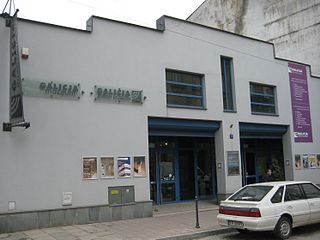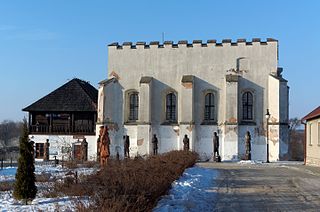 W
WThe Auschwitz Jewish Center is a non-governmental organization whose mission is to preserve the memory of the Jewish community of the city of Oświęcim and educate about the dangers of anti-Semitism, racism and other prejudices and intolerance.
 W
WThe Galicia Jewish Museum is located in the historic Jewish district of Kazimierz in Kraków, Poland. It is a photo exhibition documenting the remnants of Jewish culture and life in Polish Galicia, which used to be very vibrant in this area.
 W
WPOLIN Museum of the History of Polish Jews is a museum on the site of the former Warsaw Ghetto. The Hebrew word Polin in the museum's English name means either "Poland" or "rest here" and relates to a legend about the arrival of the first Jews to Poland.
 W
WThe Łańcut Synagogue is a Baroque synagogue in Łańcut, Poland. The Łańcut Synagogue is a rare surviving example of the vaulted synagogues with a bimah-tower, that were built throughout the Polish lands in masonry from the sixteenth through the early nineteenth centuries.
 W
WThe Markowa Ulma-Family Museum of Poles Who Saved Jews in World War II is a museum located in Markowa, Poland. The Łańcut Castle Museum began the Ulma-Family Museum's construction in 2013, and the new Museum opened on 17 March 2016.
 W
WSzydłów Synagogue was an Orthodox Judaism synagogue in Szydłów, Poland. It was built in 1534–1564 as a fortress synagogue with heavy buttresses on all sides. The synagogue was devastated by Nazis during World War II. During the war it served as a weapons and food magazine. After the war, it briefly served as a village cinema, but was eventually abandoned.
 W
WThe Tykocin Synagogue is a historic synagogue building in Tykocin, Poland. The synagogue, in mannerist-early Baroque style, was built in 1642.
 W
WThe Warsaw Ghetto Museum is a history museum in Warsaw currently under construction. It will open in 2023, on the 80th anniversary commemoration of the Warsaw Ghetto Uprising. The museum will be located in the buildings of the former Bersohn and Bauman Children's Hospital in Warsaw at 51 Śliska Street and 60 Sienna Street. On October 19, 2018 Museum director, Polish-Jewish historian Albert Stankowski received a key to the property from a government official and signed a long-term lease during a ceremony at the future museum site. Its chief historian is Daniel Blatman.
 W
WThe White Stork Synagogue is a nineteenth-century synagogue in Wrocław, Poland. Rededicated in 2010 after a decade-long renovation, it is the religious and cultural centre of the local Jewish community, under the auspices of the Union of Jewish Religious Communities in Poland. It is the only synagogue in Wrocław to have survived the Holocaust.
 W
WThe Włodawa Synagogue in Włodawa, Poland is an architectural complex consisting of two historic synagogues and a Jewish administrative building, now preserved as a museum. The complex includes the Włodawa Great Synagogue of 1764–74, the late 18th century Small Synagogue, and the 1928 community building. It is "one of the best-preserved" synagogues in Poland.